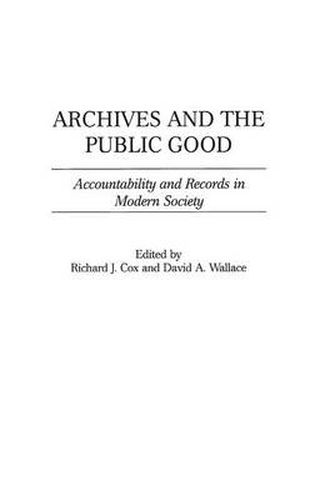Readings Newsletter
Become a Readings Member to make your shopping experience even easier.
Sign in or sign up for free!
You’re not far away from qualifying for FREE standard shipping within Australia
You’ve qualified for FREE standard shipping within Australia
The cart is loading…






Fourteen powerful case studies illustrate the importance records play for accountability in society. Focused around four closely related themes–explanation, secrecy, memory, and trust–this volume demonstrates how records compel, shape, distort, and recover social interactions across space and time. This volume widens the perspective of the roles that records play in society. As opposed to most writings in the discipline of archives and records management which view records from cultural, historical, and economical efficiency dimensions, this volume highlights that one of the most salient features of records is the role they play as sources of accountability–a component that often brings them into daily headlines and into courtrooms. Struggles over control, access, preservation, destruction, authenticity, accuracy, and other issues demonstrate time and again that records are not mute observers and recordings of activity. Rather, they are frequently struggled over as objects of memory formation and erasure. The fourteen powerful case studies focus around four closely related themes–explanation, secrecy, memory, and trust. They demonstrate how records compel, shape, distort, and recover social interactions across space and time. The diverse range of case studies includes the ownership of the Martin Luther King, Jr. papers, the destruction of records on Nazi war criminals in Canada, the politics of documents in the Iran-Contra affair, the failure of records management in the U.S. Internal Revenue Service, the publication of tobacco company documents on the World Wide Web, access to records associated with the U.S. government’s infamous Tuskegee syphilis study, the role of the U.S. National Archives in identifying assets looted by the Nazis in the wake of the Holocaust, the destruction of public records by the South African government during apartheid’s final years, the construction of foreign relations of the U.S. documentary histories, the forgery corrupting recordkeeping systems, and the collapse of foreign indigenous commercial banks.
$9.00 standard shipping within Australia
FREE standard shipping within Australia for orders over $100.00
Express & International shipping calculated at checkout
Fourteen powerful case studies illustrate the importance records play for accountability in society. Focused around four closely related themes–explanation, secrecy, memory, and trust–this volume demonstrates how records compel, shape, distort, and recover social interactions across space and time. This volume widens the perspective of the roles that records play in society. As opposed to most writings in the discipline of archives and records management which view records from cultural, historical, and economical efficiency dimensions, this volume highlights that one of the most salient features of records is the role they play as sources of accountability–a component that often brings them into daily headlines and into courtrooms. Struggles over control, access, preservation, destruction, authenticity, accuracy, and other issues demonstrate time and again that records are not mute observers and recordings of activity. Rather, they are frequently struggled over as objects of memory formation and erasure. The fourteen powerful case studies focus around four closely related themes–explanation, secrecy, memory, and trust. They demonstrate how records compel, shape, distort, and recover social interactions across space and time. The diverse range of case studies includes the ownership of the Martin Luther King, Jr. papers, the destruction of records on Nazi war criminals in Canada, the politics of documents in the Iran-Contra affair, the failure of records management in the U.S. Internal Revenue Service, the publication of tobacco company documents on the World Wide Web, access to records associated with the U.S. government’s infamous Tuskegee syphilis study, the role of the U.S. National Archives in identifying assets looted by the Nazis in the wake of the Holocaust, the destruction of public records by the South African government during apartheid’s final years, the construction of foreign relations of the U.S. documentary histories, the forgery corrupting recordkeeping systems, and the collapse of foreign indigenous commercial banks.